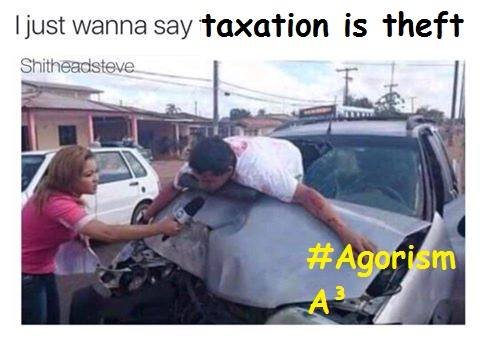The Ethics of Majority Approvals, Taxation, Theft and Agreements

Regardless of whether or not he majority agree that taxation is theft, to tax, to wit, to demand money under threat of force using the auspice of authority for no reason beyond claiming the power to do so, is to 'rob' and is, as such, theft.
As theft, to wit, the appropriation of another's property without their free consent, is understood to be immoral, or rather, unethical, then it only stands to reason that as taxation is simply a clarification of a particular type of theft, to tax must also be unethical. Majority approval does not determine the ethic or moral of the subject at hand.
People enjoy to play semantics when they have no other real argument. So when you say that taxation is unethical no matter how many people you get to agree that it is okay, there are those that want to argue or stir the pot but have no real way to do so. Thus, you receive responses such as 'if the majority agrees that taxation is theft, does that make it immoral?' Obviously, when you point out that majority approval does not bestow any form of ethic or morality upon a subject, then it is a non-argument to ask if a majority agreeing that something is immoral, does it become so. Of course not. Majority approval is often nothing more than a baseless rationalization for the worst of crimes. When you have that approval, you feel free to do what you would otherwise blanch at doing because you have no fear of judgment by your peers.
In the instance I encountered, this person went on to ask if a tax is immoral(unethical) if it is not enforced. Such as providing a service but not collecting the 'tax' for the service by force. Of course, this is still trying to play semantics. Now we are using the word tax to describe any form of monetary exchange for services, requested or not. This does not hold up and further shows that there is little argument in favor of taxation, no matter how you try to spin it.
To call providing a service with no enforced expectation of payment, with or without request of service, taxation is a misnomer. That is a generosity that accepts payment when it is proffered. This can be illustrated with any number of anti-malware programs that are fully free but 'donations are welcome' One would not say they are providing a service that they would receive a tax upon but will not seek said tax because a tax, by its very nature, is required, it is a tax upon a person, it is taxing, to wit, it is a burden of payment. It is not a tax upon a person to offer a service but not to require payment, therefore it is not a tax. Taxes are necessarily required and taxes, as they are generally conceived of in context of today and government, are necessarily enforced by violence.
Furthermore, if you provide a service and demand a fee but do not receive it from all who receive your service and you do not seek to enforce the fee, then it is no longer a fee but rather a suggested donation if you continue to provide the service regardless of payment by all recipients. If you rescind the service upon non-payment, then that is simply business(and a good reason to require payment up front).
If you provide a service without request, however, then no one is ethically bound to pay you for said service that has not requested said service as an agreement has not been entered into explicitly and your having delivered said service does not create a tacit agreement as agreements cannot, by nature, be tacit or implicit. In the instance of alleged tacit agreements, they are, in fact, assumed agreements on the part of one or more parties involved. However, an assumption is not adequate to establish a case for an agreement brokered.